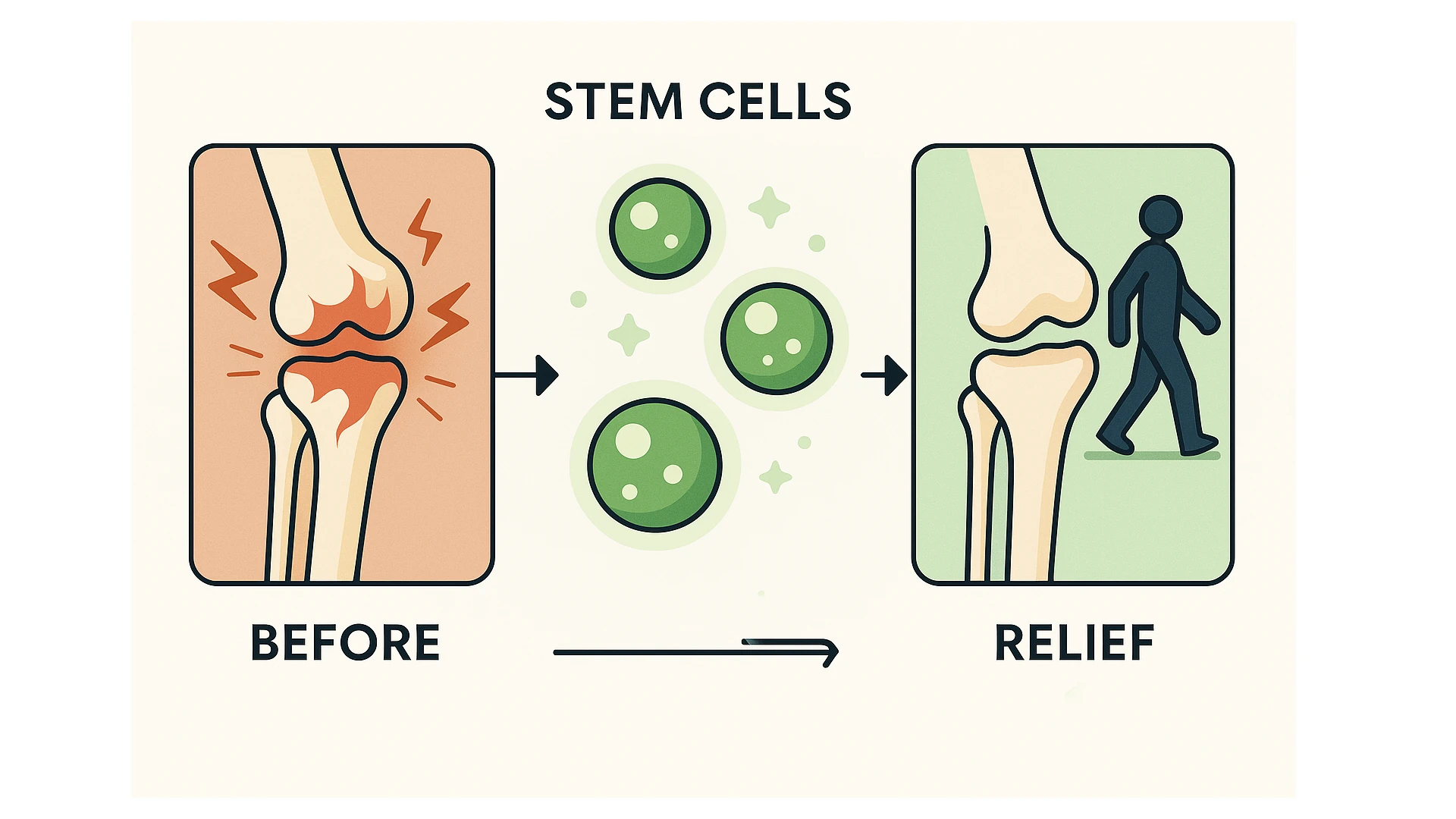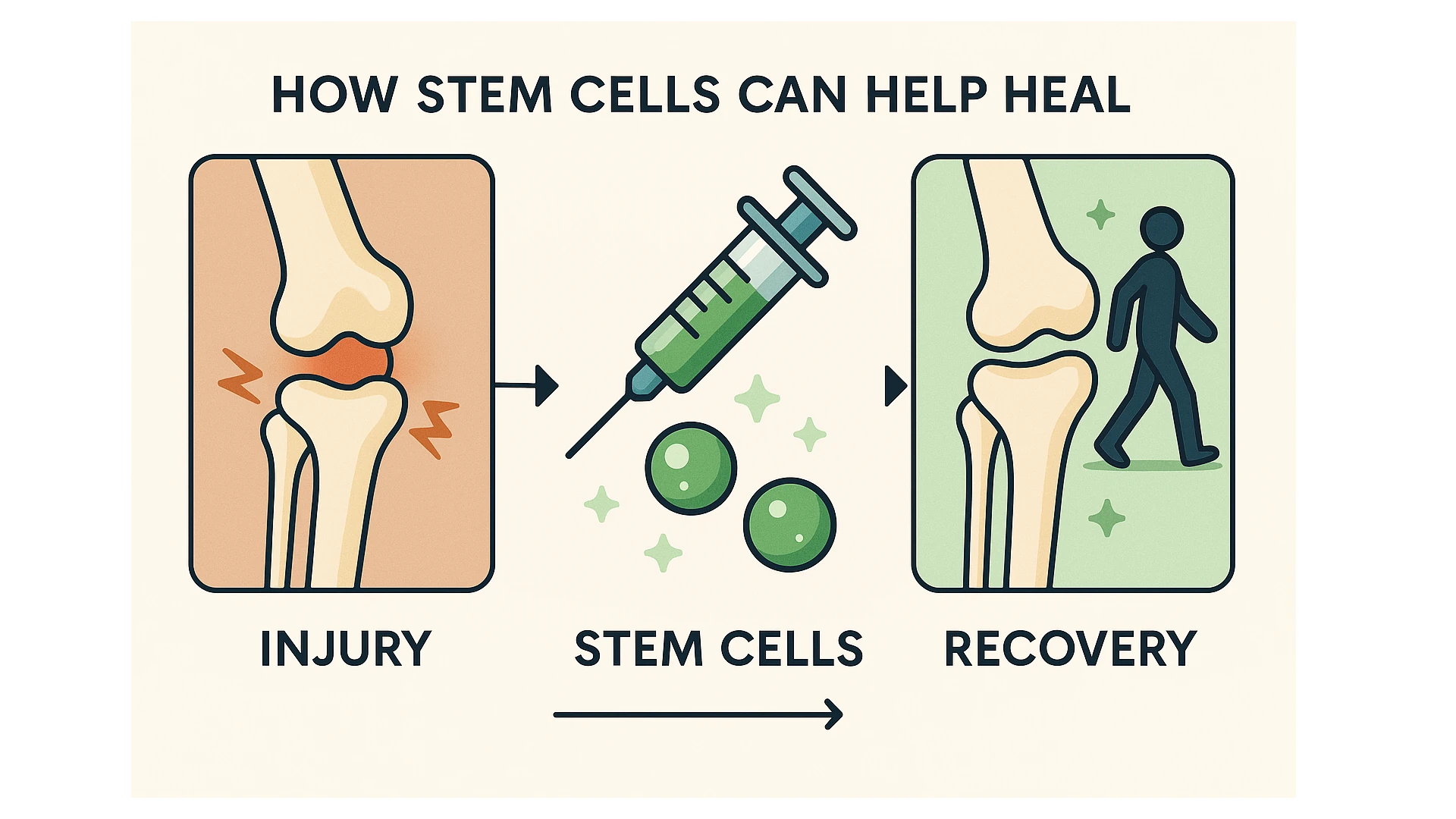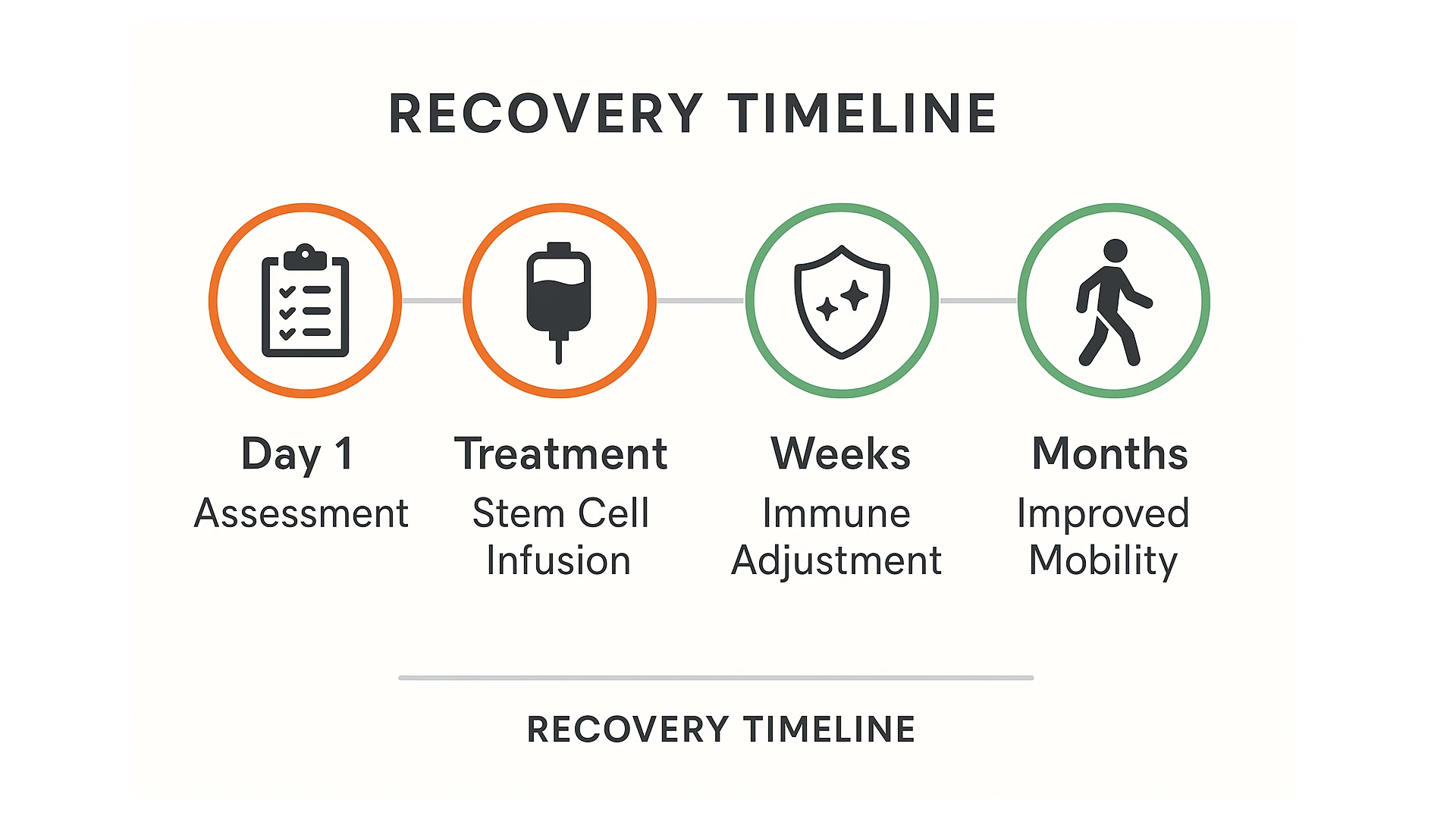Autoimmune
Stem Cell Treatment
Finding Relief from Rheumatoid Arthritis: Understanding Stem Cell Therapy for Your Joints
If persistent joint pain from rheumatoid arthritis has been limiting your daily activities, you might consider exploring stem cell therapy. This regenerative treatment is designed to modulate inflammation, alleviate pain, and help restore mobility across multiple joints simultaneously.
At its core, rheumatoid arthritis is an autoimmune condition where your immune system mistakenly attacks the synovial lining of your joints. This creates chronic inflammation that leads to pain, stiffness, fatigue, and progressive joint damage. Clinical studies show that many patients receiving stem cell therapy experience meaningful improvements in disease activity and function, with research reporting 60-80% response rates when combined with standard care.
Unlike treatments that only mask symptoms temporarily, stem cell therapy works at the cellular level to help regulate your body's overactive immune response. In this comprehensive guide, we'll explore the science behind this treatment, what to expect during the process, and help you understand if this regenerative approach could support your journey toward better joint health.

What Is Stem Cell Therapy for Rheumatoid Arthritis?
Stem cells are special cells found in places like bone marrow or fat tissue. They're like your body's repair team, with the ability to support healing in damaged tissues. These cells remain flexible and can respond to signals from areas of inflammation throughout your body.
In the context of rheumatoid arthritis, stem cells are being studied worldwide for their potential to help because they can:
- Help regulate and balance the overactive immune system
- Reduce inflammation in joints and throughout the body
- Support the repair of damaged cartilage and joint tissues
- Release healing factors that promote tissue health
Mesenchymal stem cells (MSCs) possess unique anti-inflammatory and immunomodulatory properties. When properly administered, they can travel to sites of inflammation in your body, where they release calming signals and help create a more balanced immune environment.
By modulating the immune system's response and supporting tissue health, MSCs offer a dual-action approach that addresses both the inflammatory cascade and its effects on joint tissue. At our clinic, we use stem cells in a carefully controlled process that follows strict safety guidelines.
Understanding Your Body's Autoimmune Response
In rheumatoid arthritis, your immune system loses its ability to distinguish between foreign invaders and your own tissue. Specifically, it targets the synovium, which is the protective lining that produces lubricating fluid for smooth joint movement. This mistaken attack triggers a self-perpetuating cycle of inflammation.
Over time, this inflammatory response thickens the synovium and releases enzymes that erode cartilage and bone. What starts as morning stiffness and joint tenderness can progress to permanent joint damage if the inflammatory cycle isn't interrupted.
This helps explain why RA often affects multiple joints symmetrically and why symptoms can flare unpredictably. Your immune system is essentially conducting an ongoing campaign against your joint tissue, creating inflammation that conventional treatments work to suppress but often struggle to fully resolve.
How Might Stem Cells Help with Rheumatoid Arthritis?
Rheumatoid arthritis causes problems through an overactive immune response that attacks joint tissues, leading to inflammation and damage. Stem cells have unique abilities that may help address these challenges. Here's how they work in simple terms:

1. Calming Your Immune System
In rheumatoid arthritis, your immune cells like T cells and B cells are overactive and attack your joints. Stem cells act like peacekeepers, helping to calm down these aggressive immune cells. They can suppress the activation and proliferation of these cells while promoting the generation of regulatory T cells, which are like the peacekeepers of your immune system. This immunomodulation is a key factor in how stem cells may help with rheumatoid arthritis.
2. Reducing Joint Inflammation
Stem cells have a special ability to travel to sites of inflammation in your body. Once they arrive at inflamed joints, they release anti-inflammatory molecules such as cytokines and growth factors. Research shows that stem cells can produce over 200 different supportive proteins that may help reduce inflammation. These molecules help reduce the swelling, pain, and stiffness that make daily activities so difficult.
3. Supporting Cartilage Repair
The inflammation in rheumatoid arthritis can damage the cartilage that cushions your joints. Stem cells release growth factors that may help support cartilage health and regeneration. While damaged cartilage has limited ability to heal on its own, stem cells create an environment that may support repair processes, potentially helping to preserve joint function.
4. Providing Systemic Benefits
Because rheumatoid arthritis affects your whole body, not just your joints, the systemic effects of stem cells may be particularly beneficial. By reducing overall inflammation and helping balance your immune system, stem cells may help with the fatigue, low-grade fever, and general feeling of being unwell that often accompanies rheumatoid arthritis.
5. Improving Overall Joint Health
Through their combined effects on immune regulation, inflammation reduction, and tissue support, stem cells may help improve overall joint health and function. While every person's experience is different, these actions could help reduce pain, improve mobility, and enhance your quality of life.
It's important to note that stem cell therapy for rheumatoid arthritis is still under investigation. While studies show promise, more research is needed to fully understand how stem cells can help. At our clinic, we're committed to offering this therapy responsibly, with your safety and care as our top priorities.
Your Complete Treatment Experience
At our clinic, the entire treatment process is designed to be straightforward and comfortable. We follow strict safety guidelines while ensuring you feel supported throughout your visit.
Treatment Day Timeline
Pre-Treatment Assessment
- Review of your RA diagnosis, symptoms, and current medications
- Discussion of your treatment goals and expectations
- Confirmation that you're appropriate for the procedure based on overall health
- Answering any questions you have about the process
The Procedure
- The stem cell treatment is delivered through a carefully controlled process
- Our clinic follows strict safety guidelines throughout
- The procedure is performed by experienced medical professionals
- Most patients find the process comfortable and straightforward
Post-Treatment Care
- You'll receive clear instructions for the days following treatment
- Our team provides ongoing support as your body responds to the therapy
- Follow-up appointments help us monitor your progress
- We're available to address any questions or concerns
Integrated Support Program
To help you achieve the best possible outcomes, we provide:
- Guidance on protecting your joints and appropriate exercise
- Nutritional recommendations to support your healing
- Stress management techniques (important for autoimmune conditions)
- Coordination with your existing healthcare team
Recovery Timeline and What to Expect
Initial Response Period Some patients may experience mild responses as their immune system adjusts to the treatment. This is actually a positive sign that the stem cells are engaging with your immune system. Our team will guide you on what to expect and how to manage any responses.
Early Recovery Most patients can resume their normal activities relatively quickly. You'll continue your prescribed RA medications unless advised otherwise by our medical team. Some patients notice early improvements in symptoms like morning stiffness.
Building Phase The immunomodulatory effects begin building over the following weeks. Many patients report gradual improvements in joint comfort and energy levels. We'll work with you to optimize your activity levels during this time.
Optimal Response Window This is when many patients experience their most significant improvements. Research indicates that peak results may be seen several months after treatment as the immune system rebalances and tissues have time to respond to the regenerative signals.
Long-term Progress Benefits often continue to develop and stabilize. Some patients achieve significant improvements in their disease activity, potentially allowing for adjustments in their overall treatment plan under appropriate medical supervision.

Treatment Investment
At our clinic, we believe in transparency about the investment required for stem cell therapy. The cost of treatment can vary based on individual needs and treatment protocols. During your consultation, we'll discuss:
- A comprehensive evaluation of your specific situation
- The recommended treatment approach for your needs
- A clear breakdown of all associated costs
- Available payment options
We encourage you to reach out to our clinic for a personalized consultation where we can provide specific pricing information based on your individual treatment plan.
Is Stem Cell Therapy Right for You?
Stem cell therapy at our clinic may be most appropriate for those who:
- Have been diagnosed with rheumatoid arthritis and are still experiencing symptoms despite current treatments
- Are dealing with persistent joint pain, swelling, or stiffness that affects daily life
- Are looking for innovative options to support immune system balance and joint health
- Are in overall health that allows for the procedure as determined by our clinic
We encourage you to reach out to our clinic to see if this therapy aligns with your needs. At our clinic, we're dedicated to providing honest, clear information so you can make the best choice for your health.
Comparing RA Treatment Approaches
Research on Stem Cell Therapy for Rheumatoid Arthritis Success Rate
The body of scientific evidence supporting stem cell therapy for rheumatoid arthritis continues to expand, with research from leading medical institutions demonstrating its therapeutic potential. Multiple clinical trials and comprehensive reviews have evaluated the safety and effectiveness of this regenerative treatment approach.
A major 2019 study examining umbilical cord-derived MSCs in 172 patients with rheumatoid arthritis found that those receiving stem cells alongside standard therapy showed significant improvements. The research demonstrated that 53.2% of patients achieved low disease activity compared to just 9.9% in the control group at 24 weeks.
Comprehensive research published in 2020 on interferon-γ primed MSCs showed enhanced therapeutic effects when stem cells were specially prepared before treatment. The findings revealed that 71% of patients achieved ACR20 response (20% improvement in symptoms) within 3 months, suggesting that preparation methods significantly impact outcomes.
A 2022 trial using adipose-derived stem cells demonstrated that a single intravenous infusion was well-tolerated and led to progressive improvements in pain scores and daily function over 12 months. No serious adverse events were reported during the study period.
An extensive 2023 meta-analysis reviewing safety data from multiple rheumatoid arthritis trials found that serious adverse events were not significantly different between MSC treatment and control groups. This comprehensive safety review provides reassurance while acknowledging the need for larger, longer-term studies.
Early-phase safety research from 2019 established the initial safety profile of umbilical cord-derived MSCs in inflammatory arthritis conditions. These foundational studies paved the way for the larger trials now providing more definitive evidence.
The latest 2025 review on MSC-derived exosomes explores next-generation cell-free approaches. While laboratory results are promising, exosome therapy remains in early experimental stages compared to established whole-cell MSC treatments currently available.
This growing body of evidence from respected rheumatology journals worldwide demonstrates that stem cell therapy offers a scientifically-supported treatment option for rheumatoid arthritis. The consistency of positive outcomes across multiple studies, combined with the excellent safety profile, provides a strong foundation for considering this regenerative approach.
Frequently Asked Questions
Can stem cells cure rheumatoid arthritis? There is no known cure for rheumatoid arthritis. Stem cell therapy for rheumatoid arthritis is being studied as a way to calm the immune system and support joint health. The goal is to help reduce flares and improve function, often alongside standard RA medicines. Some people reach low disease activity or remission, but results vary and no outcome is guaranteed.
Can stem cells help rheumatoid arthritis? Many patients in clinical studies report less stiffness and swelling and better day-to-day function after mesenchymal stem cells rheumatoid arthritis treatment, especially when therapy complements their existing plan. Because responses can differ from person to person, we set clear goals and monitor progress closely.
Can stem cells treat rheumatoid arthritis? Research on stem cells rheumatoid arthritis treatment focuses on how MSCs modulate the immune response. These options are investigational and not yet approved specifically for RA by the FDA or COFEPRIS. If standard therapies are not enough, we can discuss whether a regulated program makes sense for you and how it would integrate with your current plan. We can also review stem cell therapy for rheumatoid arthritis cost and logistics during your consultation.
Moving Forward with Hope
Living with rheumatoid arthritis means navigating daily challenges that others might not understand. The morning stiffness that makes simple tasks difficult, the fatigue that isn't relieved by rest, and the uncertainty of when the next flare might strike. While MSC therapy isn't a cure, emerging research suggests it may offer a path toward better disease control and improved quality of life. By working to restore immune balance rather than simply suppressing symptoms, this approach represents a different strategy in RA management. Our team understands the journey you're on and is committed to providing this innovative treatment option with the highest standards of safety and care. We're here to answer your questions, address your concerns, and support you in making the best decision for your health.
Individual results may vary. No treatment outcomes are guaranteed. This information is for educational purposes only and should not replace professional medical advice. Not evaluated or approved by the FDA or COFEPRIS for RA indications.
Treatment
- Full Blood Panel Test
- Stem Cell IV
- with 200 to 300 million stem cells
- and 5 to 10 billion exosomes
- Super Immune IV
- and any others needed
- Comprehensive Wellness Plan
- with Supplement Guidance
- and Activity & Exercise Guidance
